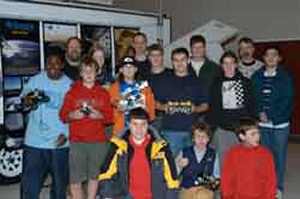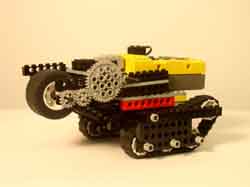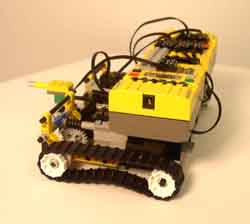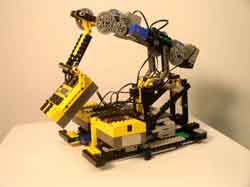Funds Enable Regional Competition
Aurora Flight Sciences Awards
Robotics Team $5,000
By Bjorn Westergard (November
23, 2005)
The
Robotics Team was awarded $5.000 last Saturday for completing five
(out of a possible seven) building challenges at Aurora Flight Sciences
Corporation’s research and development facility in Manassas last
Saturday. The visit was the culmination of several weeks
of concerted efforts by the team to complete a series of challenges
set forth by Aurora using a vast stockpile of Lego Mindstorms kits.
The challenges included building replicas of competition robots from
previous years, a robot that followed a line to an object and measured
its temperature, and robots that could walk a minimum of 10 feet.
 |
As
an incentive to conquer these objectives, Aurora generously agreed to donate
$1,000 per objective met, up to a maximum of $7,000. The donations would go a long way towards funding
the rapidly approaching 2006 season. After inspection by three
Aurora engineers, the team was granted $5,000 dollars. The
team still has the potential to make an additional $2,000 with
Lego prototypes after the 2006 season starts.
"I
think it's fantastic... we love these guys!" enthused
Mr. Ballou, the team's sponsor and tireless advocate, echoing
the general sentiment among the team.
The
majority of work on these “Lilliputian”-scale contraptions
was done by the Robotics Team's significant contingent of
underclass and eighth grade students.
|
|
Members of the GMHS Robotics Team, flanked by club sponsor Mr. Ballou,
left, and Mr. Taylor, proudly display their creations, at
Aurora Flight Sciences Corporation’s research and development
facility in Manassas, Virginia, where the team was awarded
a total of $5,000 for five small robots constructed from
Lego Mindstorms
|
"[These
challenges] provided an opportunity for the veteran members of the
team to teach elementary mechanical design and programming concepts
to new recruits, who we now hope will be able to more meaningfully
contribute during the competition season," commented the team
president and lead programmer Bjorn Westergard.
 |
 |
 |
| A "climbing" robot ready to tackle some steep
gradients! |
A robot built to walk down a line to an object and measure its
temperature. |
A "lifting" robot demonstrates its capabilities. |
Aurora
Flight Sciences designs, manufactures, and operates unmanned aerial
vehicles for scientific and military applications. The company's
president, Dr. John Langford, conceived the unique partnership and
gave the team a tour of the facilities. He
encouraged the students to "continue to pursue engineering careers." Students
witnessed first-hand the engineering process as they saw awe-inspiring,
completed aircraft as well as the discarded designs that led to the
most current models. The parallels between the GM robotics program
and the reality of professional engineering were very evident.
The
George Mason Robotics Team (also known by its Latin moniker "Vae Victus")
will need the funds for its third year of participation in the international
FIRST (For Inspiration and Recognition of Science and Technology) robotics
competition.
Every year a new and entirely different game/task
is announced in early January. Teams receive a kit of parts that includes
a common radio interface, processor, motors, and assorted electronic
components. Teams then have six weeks to design and build a robot that
will use the kit of parts to play the game both under remote control
and autonomously (operating based on programmed algorithms and sensor
input). The only constraints
are creative ability and a few rules to ensure safety. The program
aims to give students a feel for what engineering is like, not only
in the sense of applied math and science, but also in other ways, such
as working within team, working with other teams, meeting deadlines,
and even marketing oneself to the public.
With
this most recent donation from Aurora, the team has collected a total
of $8,000. Other sponsors
of the team include the Falls Church Police Association, Digital
Design and Imaging, and GMHS itself. These
funds will go towards the $6,000 entrance fee for the FIRST regional
competition in Annapolis, Maryland in March, as well as the aforementioned
kit of parts. While the team is ecstatic to have secured the funding
needed to compete this year, they remain dedicated to reaching their
fundraising goal of $12,000, which would allow them to compete in
the international championships in Atlanta, Georgia or attend a
second regional competition.

